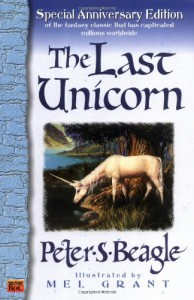The Last Unicorn
 Like Alice in Wonderland, I feel like you probably (as an adult at least) have to be in an...um.....alternative frame of mind... to fully appreciate the work Beagle did here. Eloquent and lyric as almost no other high fantasy I've read since maybe Tolkien, but without the loftiness that maybe smacks of elitism, Beagle tells the somewhat cloying tale of the Last Unicorn on Earth as she searches for her lost brethren on a Campbellesque quest that involves a magician, an outlaw (tastefully cast femininely) and a wicked old king in a crumbling ruin of a castle with a pet bull (which is Red - no wings though). At times it felt like I was reading a psychedelic incarnation of My Little Pony. The Last Unicorn treads that fine line in grandiloquently told fables that are satisfactory as children's tales, but beg to be considered something far more. (Subsequent editions and versions of The Hobbit come to mind. At least those re-worked after the publication of the Rings trilogy, when Tolkien aimed to make their prequel something far more than it originally was.) And there is certainly much to recommend it, with brilliant literary and artistic allusions designed to capture the intellect and heart of those thoroughly immersed in a culture similar to the author's.
Like Alice in Wonderland, I feel like you probably (as an adult at least) have to be in an...um.....alternative frame of mind... to fully appreciate the work Beagle did here. Eloquent and lyric as almost no other high fantasy I've read since maybe Tolkien, but without the loftiness that maybe smacks of elitism, Beagle tells the somewhat cloying tale of the Last Unicorn on Earth as she searches for her lost brethren on a Campbellesque quest that involves a magician, an outlaw (tastefully cast femininely) and a wicked old king in a crumbling ruin of a castle with a pet bull (which is Red - no wings though). At times it felt like I was reading a psychedelic incarnation of My Little Pony. The Last Unicorn treads that fine line in grandiloquently told fables that are satisfactory as children's tales, but beg to be considered something far more. (Subsequent editions and versions of The Hobbit come to mind. At least those re-worked after the publication of the Rings trilogy, when Tolkien aimed to make their prequel something far more than it originally was.) And there is certainly much to recommend it, with brilliant literary and artistic allusions designed to capture the intellect and heart of those thoroughly immersed in a culture similar to the author's. Truth be told, I don't quite know what to make of it. Viewed as a morality tale for children, it certainly has much to recommend it. Its appeals to identity, self-worth and individual value are integrated quite obviously so as not to miss the attention of a five year old fading to sleep as their parent sends them off to bed with the story. That's in no way a criticism, if that's what the story intends itself to be. There's a beauty and splendor to the tale that is intwined with its simplicity. The novel could also easily be a meditation on the hero's journey, dutifully fulfilling the requisite criteria and showing how compelling such stories are to the human psyche in their myriad reflected forms. Or, it could very well be the drug-induced progeny of a sophisticated brain a'la Alice - right down to the "far out" butterfly who speaks in riddled references to the "real" world as an early spiritual advisor to the unicorn in the place of the opium smoking caterpillar. One can't escape the thought that such an inclusion was intentional and the inclusion of the butterfly a none-too-subtle reference to Alice and a message of the evolved sophistication of this tale over its predecessor.
All of these things make the craftsmanship extraordinarily adept. Yet the question remains, is it enjoyable? In broad strokes, yes. I can imagine reading this to my children and it being received with desired effect: an opening of imagination and a desire to follow the tale to the end. But I have lingering questions as to the purpose of the tale. Call me overly utilitarian, but my confusion as to the identity or purpose of the story distracts me from the story itself. I guess it could be anything that the reader desires it to be, in which case you can deem it brilliant in the genre of fantasy work. Perhaps its malleability allows for successive re-readings with layers and depth that provoke deep thought.
I reserve judgment until I've re-read. I'll let you know more definitively after my second time through.



